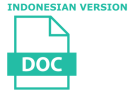Dampak dan Strategi untuk Mengatasi Kecemasan Berbicara dalam Pembelajaran Bahasa Inggris sebagai Bahasa Ke-2 (ESL) dan Asing (EFL)
Thomas Joko Priyo Sembodo(1*)
(1) English Department Faculty of Cultural Sciences UGM
(*) Corresponding Author
Abstract
This paper aims at addressing the issue of speaking anxiety in ESL/EFL learning. This study of literature is believed to be significant as it can give insights into ESL/EFL anxiety and how it can be coped. In doing so, this paper starts with the description of the nature of language anxiety in ESL/EFL learning particularly speaking anxiety, its theoretical overview, causes of such an anxiety, and its effects on ESL/EFL learning. Furthermore, there is a review of studies on strategies used to cope with language and speaking anxiety in ESL/EFL learning or classrooms. These coping strategies can be classified into two categories, namely 1) self-employed strategies employed by anxious learners consisting of five strategies--in which two are inapplicable, and 2) employed by teachers, which consists of three strategies. Those strategies are able to help overcome the learner’s anxiety, leading to the more successful ESL/EFL learning. In addition, in ESL/EFL classrooms teachers play a key role in relieving anxiety experienced by their students. In conclusion, speaking anxiety can have debilitating impacts on learners experiencing it. However, this problem can be overcome with strategies employed by learners and their teachers.
Keywords
Full Text:
PDFReferences
Bailey, P., Onwuegbuzie, A.J., & Daley, C.E. (2000). Correlates of Anxiety at Three Stages of the Foreign Language Learning Process [Electronic version]. Journal of Language and Social Psychology, 19, 474-490.
Chen, T. Y., & Chang, G. B. (2004). The Relationship between Foreign Language Anxiety and Learning Difficulties. Foreign Language Annals, 37(2), 278-289.
Daubney, M. (n.d.). Language Anxiety: Creative or Negative Force in the Language Classroom? Retrieved October 15, 2007, from http://www.appi.pt/recursos/docsformacao/MDaubney1.pdf
Dornyei, Z. (2001). Motivational Strategies in the Language Classroom. Cambridge: Cambridge University Press.
Ewald, J. D. (2007). Foreign language learning anxiety in upper-level classes: involving students as researchers [Electronic version]. Foreign Language Annals, 40(1), 122-142.
Ganschow, L. & Sparks, R. L. (2007). Is the Foreign Language Classroom Anxiety Scale Measuring Anxiety or Language Skills? [Electronic version]. Foreign Language Annals, 40(2), 260-286.
Gregersen, T., & Horwitz, E. K. (2002). Language Learning and Perfectionism: Anxious and Non-anxious Language Learners' Reactions to Their Own Oral Performance [Electronic version]. The Modern Language Journal, 86(4), 562-570.
Horwitz, M.B., Horwitz, E.K., & Cope, J.A. (1986). Foreign Language Classroom Anxiety. The Modern Language Journal, 70(2), 125-132.
Kondo, D. S., & Ling, Y. Y. (2004). Strategies for Coping with Language Anxiety: The Case of Students of English in Japan. ELT Journal, 58(3), 258-265.
MacIntyre, P. D. (1995). How Does Anxiety Affect Second Language Learning? A Reply to Sparks and Ganschow [Electronic version]. The Modern Language Journal, 79(1), 90-99.
Nunan, D. (1999). Second Language Teaching & Learning. Boston: Heinle & Heinle Publishers.
Pappamihiel, N.E. (2002). English as a Second Language Students and English Language Anxiety. Issues in the mainstream classroom. Proquest Education Journal, 36(3), 327-355.
Woodrow, L. (2006). Anxiety and Speaking English as a Second Language [Electronic version]. RELC Journal, 37 (3), 308-328.
Article Metrics
Refbacks
- There are currently no refbacks.
Copyright (c) 2018 The Author(s)

This work is licensed under a Creative Commons Attribution-ShareAlike 4.0 International License.







